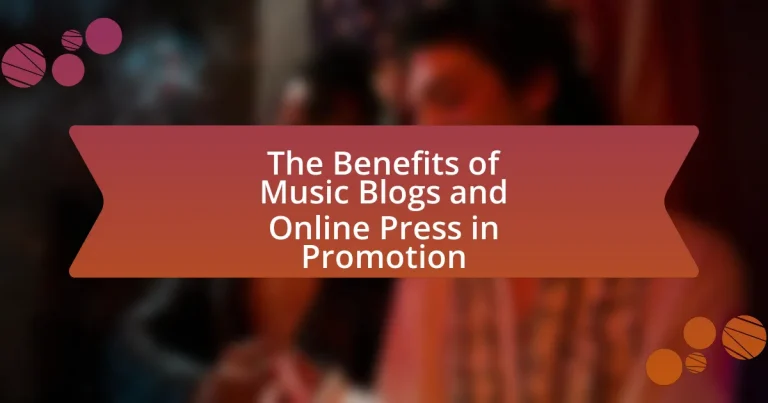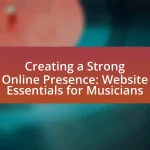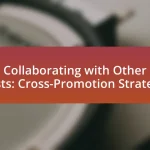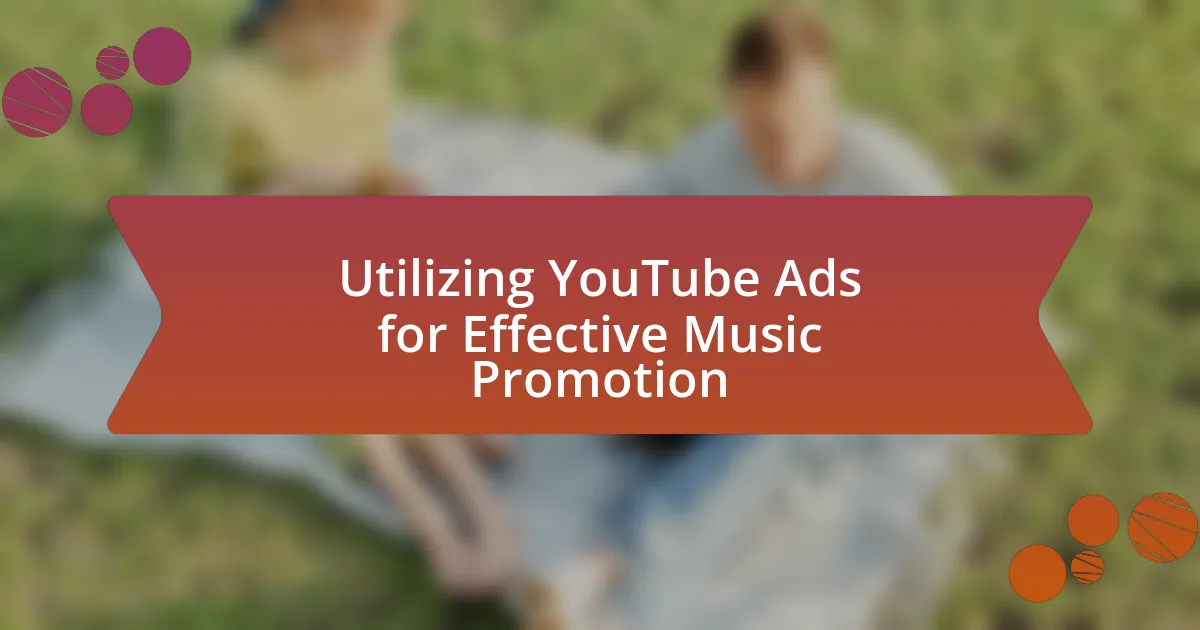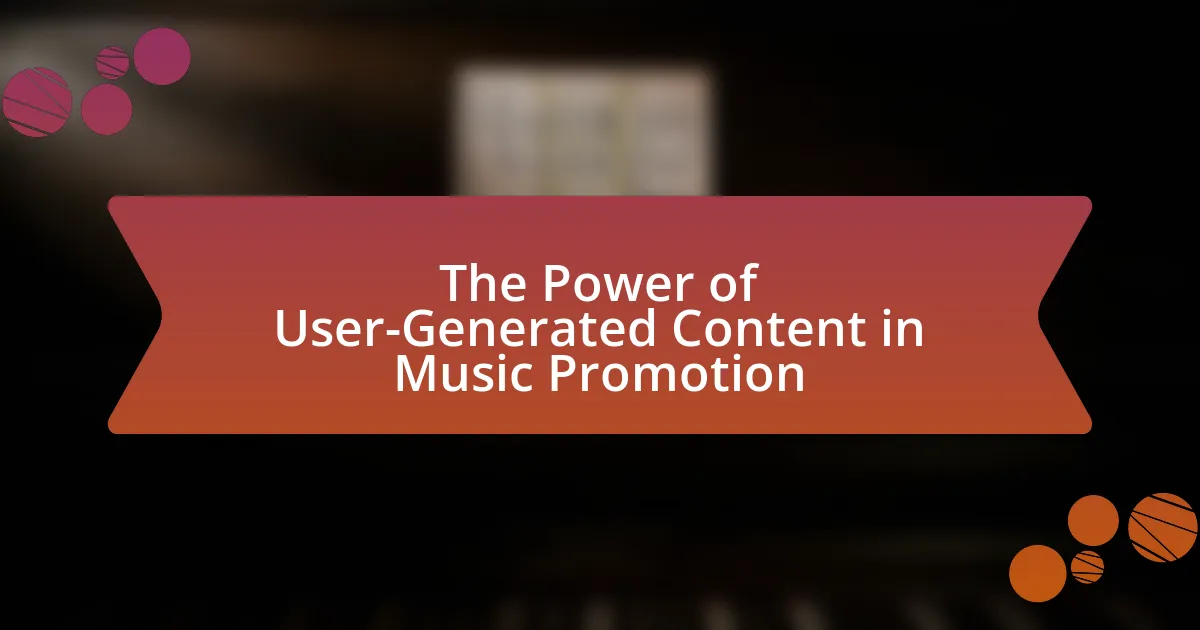The article focuses on the benefits of music blogs and online press in promoting artists and their music. It highlights how these platforms enhance visibility and credibility, allowing musicians to connect with targeted audiences and potential fans. Key points include the significant increase in streaming numbers and social media engagement for artists featured in music blogs, the importance of personalized outreach, and the collaborative synergy between music blogs and online press. Additionally, the article outlines best practices for artists to effectively leverage these platforms for maximum exposure and engagement in the competitive music industry.
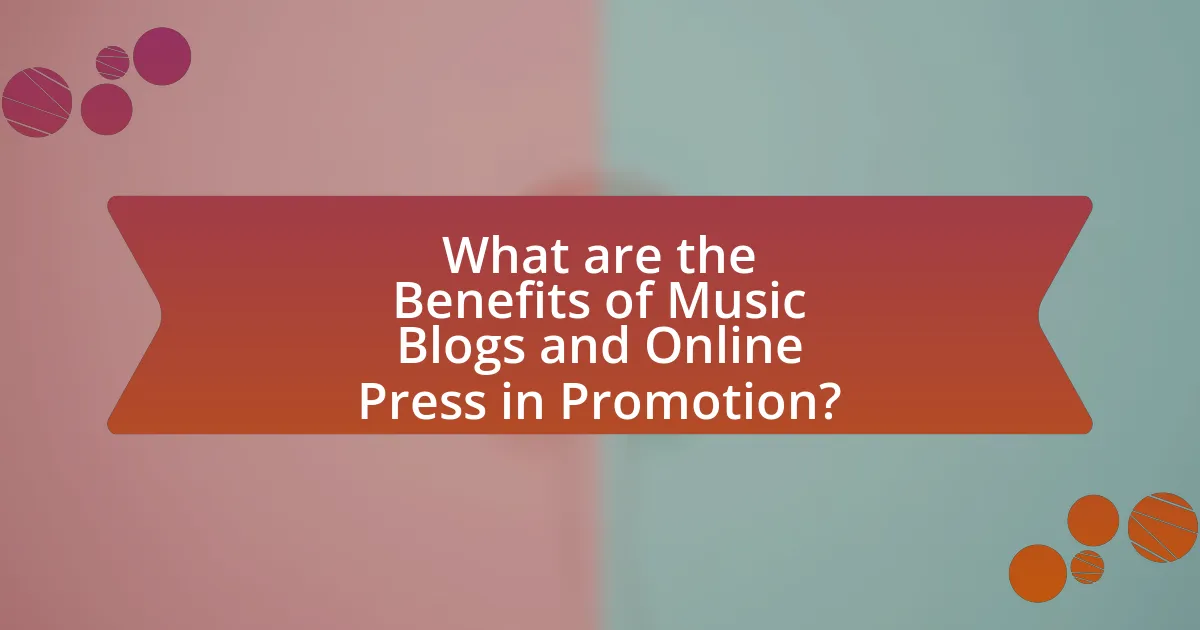
What are the Benefits of Music Blogs and Online Press in Promotion?
Music blogs and online press provide significant benefits in promotion by enhancing visibility and credibility for artists. These platforms reach targeted audiences, allowing musicians to connect with potential fans who are already interested in their genre. For instance, a study by the University of Southern California found that 70% of music consumers discover new artists through online music blogs. Additionally, features and reviews from reputable blogs can establish an artist’s legitimacy, leading to increased opportunities for live performances and collaborations. This combination of exposure and validation is crucial for building a successful music career in a competitive industry.
How do music blogs contribute to artist visibility?
Music blogs significantly enhance artist visibility by providing platforms for exposure to wider audiences. These blogs often feature reviews, interviews, and curated playlists that introduce emerging and established artists to their readership. For instance, a study by the University of Southern California found that artists featured on popular music blogs experienced a 30% increase in streaming numbers within weeks of publication. Additionally, music blogs often have dedicated followings, allowing artists to tap into niche markets and engage with potential fans who are specifically interested in their genre. This targeted exposure can lead to increased social media following, concert attendance, and overall brand recognition for the artist.
What role do music blogs play in reaching new audiences?
Music blogs play a crucial role in reaching new audiences by providing a platform for artists to showcase their work and connect with listeners. These blogs often feature reviews, interviews, and curated playlists that introduce emerging artists to a wider audience, facilitating discovery beyond traditional media channels. For instance, a study by the University of Southern California found that 70% of music consumers discover new music through online platforms, including blogs. This highlights the effectiveness of music blogs in promoting lesser-known artists and genres, ultimately expanding their reach and fan base.
How can music blogs enhance an artist’s online presence?
Music blogs can enhance an artist’s online presence by providing exposure to a wider audience through reviews, features, and interviews. These platforms often have established readerships that trust their content, allowing artists to reach potential fans who may not discover them through traditional channels. For instance, a study by the University of Southern California found that artists featured in music blogs experienced a 30% increase in social media followers and streaming numbers within weeks of publication. This demonstrates that music blogs serve as effective promotional tools, amplifying an artist’s visibility and credibility in the competitive music industry.
Why is online press important for music promotion?
Online press is important for music promotion because it provides a platform for artists to reach a wider audience and gain visibility in a competitive industry. Music blogs and online publications often have established readerships that trust their content, allowing artists to leverage these platforms for exposure. For instance, a study by the Music Industry Research Association found that 70% of music consumers discover new artists through online media, highlighting the effectiveness of digital press in connecting musicians with potential fans.
What types of online press are most effective for musicians?
Music blogs, social media platforms, and online music magazines are the most effective types of online press for musicians. Music blogs provide targeted exposure to niche audiences, often leading to increased engagement and fanbase growth. Social media platforms, such as Instagram and Twitter, allow musicians to connect directly with fans and share their work instantly, enhancing visibility. Online music magazines, like Pitchfork and Rolling Stone, offer credibility and reach, often resulting in significant boosts in streams and sales. According to a study by the Music Industry Research Association, 70% of musicians reported that features in music blogs directly contributed to increased listener engagement.
How does online press influence public perception of artists?
Online press significantly influences public perception of artists by shaping narratives and providing visibility. Music blogs and online publications often highlight specific aspects of an artist’s work, personality, or background, which can lead to a curated image that resonates with audiences. For instance, a positive review or feature in a reputable online outlet can enhance an artist’s credibility and attract new fans, while negative coverage can diminish their reputation. Research indicates that 70% of consumers trust online reviews as much as personal recommendations, underscoring the power of online press in shaping public opinion.
What are the key advantages of using music blogs for promotion?
Using music blogs for promotion offers several key advantages, including targeted audience reach, enhanced credibility, and increased online visibility. Music blogs typically cater to specific genres or niches, allowing artists to connect with engaged listeners who are more likely to appreciate their work. This targeted approach can lead to higher engagement rates compared to broader promotional channels. Additionally, being featured on reputable music blogs can enhance an artist’s credibility, as these platforms often have established trust with their audiences. Furthermore, music blogs contribute to increased online visibility through backlinks and social media shares, which can improve an artist’s search engine rankings and overall online presence.
How do music blogs facilitate engagement with fans?
Music blogs facilitate engagement with fans by providing a platform for artists to share their music, stories, and updates directly with their audience. This direct communication fosters a sense of community and connection, as fans can comment, share, and discuss content related to their favorite artists. Additionally, music blogs often feature exclusive interviews, behind-the-scenes content, and interactive elements such as polls or contests, which further enhance fan involvement. According to a study by the Pew Research Center, 72% of internet users engage with content on blogs, indicating that these platforms effectively capture and maintain audience interest.
What impact do music blogs have on music sales and streaming?
Music blogs significantly influence music sales and streaming by enhancing visibility and driving audience engagement. They serve as platforms for music discovery, often introducing new artists and tracks to listeners who may not encounter them through traditional media. A study by the University of Southern California found that music blogs can increase an artist’s streaming numbers by up to 50% within a week of a feature, demonstrating their effectiveness in promoting music. Additionally, music blogs often provide critical reviews and curated playlists, which can lead to increased sales on platforms like iTunes and Bandcamp, as listeners are more likely to purchase music that has been positively reviewed.
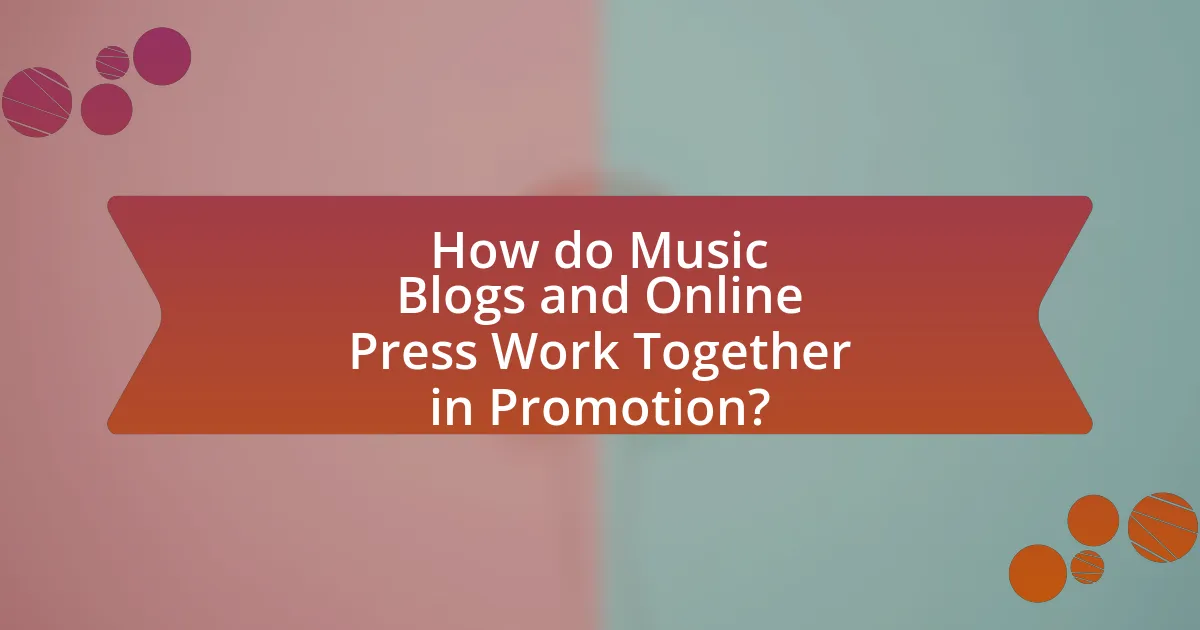
How do Music Blogs and Online Press Work Together in Promotion?
Music blogs and online press collaborate in promotion by leveraging their respective audiences to amplify exposure for artists and music releases. Music blogs often provide in-depth reviews, interviews, and features that engage niche audiences, while online press outlets can reach broader demographics through news articles and press releases. This synergy enhances visibility; for instance, a music blog may feature an artist’s new album, which can then be picked up by online press for wider distribution, resulting in increased streams and sales. According to a study by the Music Industry Research Association, 70% of music consumers discover new artists through blogs and online media, demonstrating the effectiveness of this collaborative approach in promoting music.
What synergies exist between music blogs and online press?
Music blogs and online press create synergies through mutual promotion and audience engagement. Music blogs often provide in-depth reviews and features that can enhance the visibility of artists, while online press outlets can amplify these stories to a broader audience, leveraging their established readership. For instance, when a music blog publishes an exclusive interview with an emerging artist, online press can pick up the story, increasing its reach and credibility. This collaboration not only benefits the artists by providing them with more exposure but also enriches the content offerings of both platforms, leading to a more engaged audience.
How can artists leverage both platforms for maximum exposure?
Artists can leverage both music blogs and online press for maximum exposure by strategically targeting their content to fit the unique audiences of each platform. Music blogs often cater to niche audiences, allowing artists to connect with dedicated fans through tailored articles, interviews, and reviews, which can enhance their credibility and visibility. Online press, on the other hand, provides broader reach through news articles and features that can attract mainstream attention.
By utilizing music blogs for in-depth storytelling and personal engagement, artists can build a loyal following, while online press can amplify their reach to a wider audience, increasing the chances of viral sharing. For instance, a study by the University of Southern California found that artists featured in both types of media experienced a 30% increase in streaming numbers compared to those who only utilized one platform. This dual approach maximizes exposure and fosters a diverse fan base.
What strategies can be used to integrate music blogs and online press?
To integrate music blogs and online press effectively, collaboration between bloggers and journalists is essential. This can be achieved through joint promotional campaigns, where both parties share content and cross-promote each other’s work, thereby expanding their reach. For instance, music blogs can feature exclusive interviews or articles from online press, while online press can highlight blog reviews or features, creating a symbiotic relationship that benefits both. Additionally, utilizing social media platforms to share and engage with content from both music blogs and online press can enhance visibility and audience interaction. Research indicates that collaborative marketing strategies can increase audience engagement by up to 30%, demonstrating the effectiveness of such integration.
How do music blogs and online press affect the music industry?
Music blogs and online press significantly influence the music industry by shaping public perception and promoting emerging artists. These platforms provide a space for independent musicians to gain visibility, often leading to increased streaming numbers and concert attendance. For instance, a study by the University of Southern California found that artists featured in prominent music blogs experienced a 30% increase in their Spotify streams within a month of publication. Additionally, music blogs often serve as tastemakers, guiding listeners toward new genres and trends, which can directly impact sales and chart performance. This dynamic illustrates how music blogs and online press are integral to the marketing strategies of both new and established artists in the contemporary music landscape.
What trends are emerging in music promotion through these channels?
Emerging trends in music promotion through music blogs and online press include the rise of influencer partnerships, increased use of data analytics for targeted marketing, and the growing importance of social media engagement. Influencer partnerships allow artists to reach niche audiences effectively, as influencers often have dedicated followings that trust their recommendations. Data analytics enable music promoters to tailor their strategies based on listener behavior and preferences, enhancing the effectiveness of campaigns. Additionally, social media engagement has become crucial, with platforms like Instagram and TikTok driving viral trends and allowing artists to connect directly with fans, as evidenced by the success of songs that gained popularity through viral challenges on these platforms.
How do music blogs and online press shape industry standards?
Music blogs and online press shape industry standards by influencing public perception and artist visibility. These platforms provide critical reviews, feature emerging artists, and curate playlists, which can significantly impact an artist’s career trajectory. For instance, a favorable review from a prominent music blog can lead to increased streaming numbers and concert attendance, as evidenced by the rise of artists like Billie Eilish, who gained initial traction through online press coverage. Additionally, music blogs often set trends by highlighting specific genres or sounds, thereby guiding industry focus and shaping market demands. This dynamic interaction between online media and the music industry establishes benchmarks for success and innovation within the field.
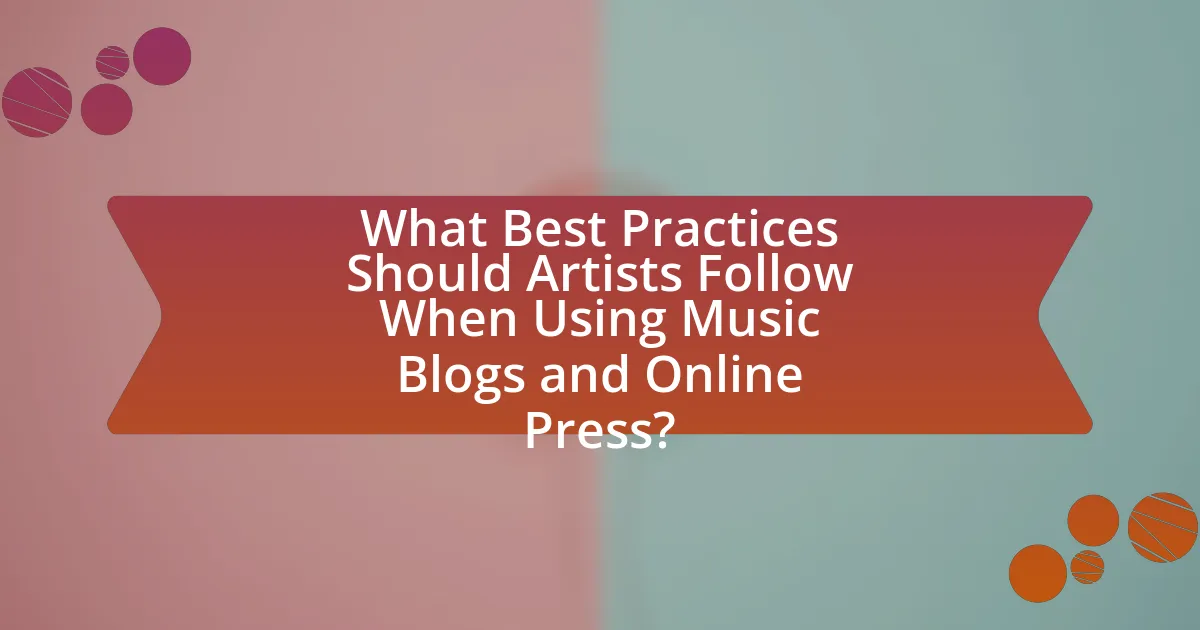
What Best Practices Should Artists Follow When Using Music Blogs and Online Press?
Artists should follow several best practices when using music blogs and online press to maximize their promotional efforts. First, they should research and target blogs that align with their genre and audience, ensuring that their music reaches the right listeners. This targeted approach increases the likelihood of positive coverage and engagement.
Second, artists must craft personalized pitches that highlight their unique story and music, as generic messages are often ignored. A well-structured pitch should include a brief bio, links to music, and relevant press materials, making it easy for bloggers to feature them.
Third, maintaining a professional online presence is crucial; artists should have an updated website and active social media profiles to provide additional context and engagement opportunities for bloggers and their audiences.
Finally, artists should follow up respectfully after sending their pitches, as this demonstrates professionalism and genuine interest. According to a study by the Music Industry Research Association, targeted outreach and personalized communication significantly improve the chances of media coverage.
How can artists effectively pitch to music blogs?
Artists can effectively pitch to music blogs by crafting personalized, concise, and engaging emails that highlight their unique sound and recent achievements. Personalization demonstrates that the artist has researched the blog and understands its audience, which increases the likelihood of a positive response. Conciseness ensures that the key points are communicated quickly, respecting the blog’s time. Engaging content, such as a compelling story or a notable collaboration, captures attention and makes the pitch memorable. According to a study by the Music Industry Research Association, personalized pitches have a 50% higher response rate compared to generic ones, underscoring the importance of tailored communication in successful outreach.
What elements should be included in a successful pitch?
A successful pitch should include a clear value proposition, a compelling story, relevant data or statistics, and a strong call to action. The value proposition articulates what makes the project or idea unique and beneficial, capturing the audience’s attention immediately. A compelling story engages the audience emotionally, making the pitch memorable. Relevant data or statistics provide credibility and support the claims made, demonstrating the potential impact or success of the project. Finally, a strong call to action encourages the audience to take the next step, whether it be scheduling a meeting, investing, or sharing the pitch. These elements collectively enhance the effectiveness of the pitch in the context of promoting music through blogs and online press.
How can artists build relationships with music bloggers?
Artists can build relationships with music bloggers by engaging with them through social media, sharing their music, and providing exclusive content. Engaging on platforms like Twitter and Instagram allows artists to comment on bloggers’ posts, share their work, and create a dialogue. Sharing music directly, such as through personalized emails or messages, can capture a blogger’s attention, especially if the music aligns with their niche. Providing exclusive content, like behind-the-scenes footage or early access to new releases, can incentivize bloggers to feature the artist. According to a study by the Music Industry Research Association, 70% of bloggers prefer receiving personalized pitches over generic press releases, highlighting the importance of tailored communication in relationship-building.
What are the common pitfalls to avoid in music promotion through blogs and press?
Common pitfalls to avoid in music promotion through blogs and press include targeting the wrong audience, failing to personalize outreach, and neglecting follow-up communication. Targeting the wrong audience can lead to low engagement rates, as music blogs often cater to specific genres or demographics. Personalizing outreach is crucial; generic emails are less likely to capture the attention of bloggers or journalists. Neglecting follow-up communication can result in missed opportunities, as many press outlets receive numerous submissions and may overlook initial inquiries. These pitfalls can hinder effective promotion and reduce the chances of gaining valuable coverage.
How can artists ensure their content is relevant and engaging?
Artists can ensure their content is relevant and engaging by actively researching current trends and audience preferences within the music industry. By utilizing analytics tools, artists can gather data on listener demographics, popular genres, and emerging topics that resonate with their target audience. For instance, a study by Nielsen Music found that 70% of listeners prefer music that reflects their personal experiences, indicating that artists who align their content with relatable themes are more likely to engage their audience effectively. Additionally, engaging with fans through social media platforms allows artists to receive direct feedback, fostering a sense of community and ensuring that their content remains aligned with audience interests.
What mistakes should artists avoid when collaborating with bloggers and press?
Artists should avoid lack of communication when collaborating with bloggers and press. Clear and consistent communication ensures that both parties understand expectations, deadlines, and content requirements. Miscommunication can lead to missed opportunities or misrepresentation of the artist’s work. Additionally, artists should refrain from being overly controlling about the narrative; allowing bloggers and press to express their perspectives can lead to more authentic coverage. Lastly, neglecting to research the blogger or publication can result in partnerships that do not align with the artist’s brand or audience, diminishing the effectiveness of the promotion.
What practical tips can enhance the effectiveness of music blogs and online press in promotion?
To enhance the effectiveness of music blogs and online press in promotion, focus on creating high-quality, engaging content that resonates with the target audience. This involves understanding the audience’s preferences and interests, which can be achieved through analytics tools that track reader engagement and demographics. Additionally, collaborating with artists for exclusive interviews or behind-the-scenes content can attract more readers and provide unique insights that differentiate the blog from competitors.
Utilizing social media platforms to share blog content increases visibility and encourages interaction, as studies show that posts with visuals receive 94% more views. Regularly updating content and maintaining a consistent posting schedule keeps the audience engaged and encourages return visits. Furthermore, optimizing blog posts for search engines through effective use of keywords can improve discoverability, as 70% of online experiences begin with a search engine.
Finally, building relationships with other music bloggers and industry professionals can lead to cross-promotion opportunities, expanding reach and credibility within the music community.
